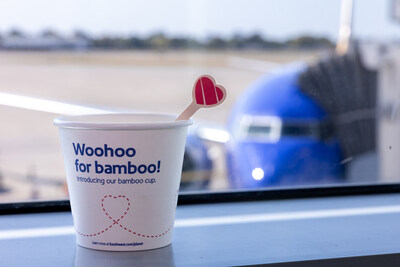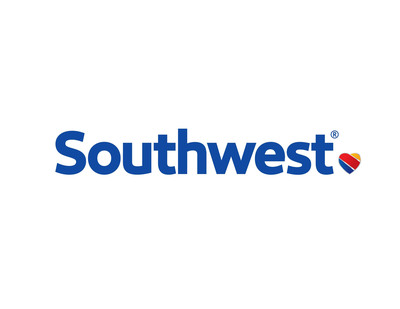QUITE A STIR: SOUTHWEST AIRLINES LAUNCHES NEW INFLIGHT CUP AND STIR STICK DESIGNED TO REDUCE ANNUAL SINGLE-USE PLASTICS BY MORE THAN 1.5 MILLION POUNDS
Southwest Airlines (NYSE: LUV) has introduced new eco-friendly inflight items: a bamboo cup for cold beverages and a wood stir stick with the company's Heart branding. These changes are expected to reduce single-use plastics by more than 1.5 million pounds annually. The new cold cup is made from 93% non-plastic materials, combining bamboo and paper with a polyethylene lining. The company has also transitioned to paper overwrap for napkins and plans to introduce new snack offerings on Hawaii flights, which could reduce plastic packaging by 18,000 pounds annually. These initiatives are part of Southwest's Nonstop to Net Zero strategy and their goal to eliminate single-use plastics from inflight service by 2030.
Southwest Airlines (NYSE: LUV) ha introdotto nuovi articoli eco-friendly per il volo: una tazza di bambù per le bevande fredde e una stirrer in legno con il marchio Heart dell'azienda. Questi cambiamenti dovrebbero ridurre la plastica monouso di oltre 1,5 milioni di libbre all'anno. La nuova tazza per bevande fredde è composta per il 93% da materiali non plastici, combinando bambù e carta con un rivestimento in polietilene. L'azienda ha anche passato agli involtini di carta per i tovaglioli e prevede di introdurre nuove offerte di snack sui voli per le Hawaii, il che potrebbe ridurre l'imballaggio in plastica di 18.000 libbre all'anno. Queste iniziative fanno parte della strategia Nonstop to Net Zero di Southwest e del loro obiettivo di eliminare la plastica monouso dal servizio di volo entro il 2030.
Southwest Airlines (NYSE: LUV) ha introducido nuevos artículos ecológicos a bordo: un vaso de bambú para bebidas frías y un palito de madera con la marca Heart de la compañía. Se espera que estos cambios reduzcan los plásticos de un solo uso en más de 1.5 millones de libras anualmente. El nuevo vaso para bebidas frías está hecho del 93% de materiales no plásticos, combinando bambú y papel con un revestimiento de polietileno. La compañía también ha pasado a envolturas de papel para las servilletas y planea introducir nuevas ofertas de bocadillos en los vuelos a Hawái, lo que podría reducir el empaque plástico en 18,000 libras anuales. Estas iniciativas son parte de la estrategia Nonstop to Net Zero de Southwest y de su objetivo de eliminar los plásticos de un solo uso en el servicio a bordo para 2030.
사우스웨스트 항공 (NYSE: LUV)이 새로운 친환경 기내 용품을 도입했습니다: 차가운 음료를 위한 대나무 컵과 회사의 Heart 브랜드가 있는 나무 저어주기 스틱입니다. 이러한 변화는 연간 150만 파운드 이상의 일회용 플라스틱을 줄이는 데 기여할 것으로 예상됩니다. 새로운 차가운 음료 컵은 93% 비 플라스틱 소재로 만들어지며, 대나무와 종이를 폴리에틸렌 라이닝과 결합했습니다. 회사는 또한 냅킨을 위한 종이 포장으로 전환했으며, 하와이 항공편에서 새로운 간식 제공을 계획하고 있으며, 이는 연간 18,000 파운드의 플라스틱 포장을 줄일 수 있습니다. 이러한 이니셔티브는 사우스웨스트의 Nonstop to Net Zero 전략의 일환이며, 2030년까지 기내 서비스에서 일회용 플라스틱을 없애는 목표를 가지고 있습니다.
Southwest Airlines (NYSE: LUV) a introduit de nouveaux articles écologiques à bord : un gobelet en bambou pour les boissons froides et une cuillère en bois portant la marque Heart de l'entreprise. Ces changements devraient réduire les plastiques à usage unique de plus de 1,5 million de livres par an. Le nouveau gobelet pour boissons froides est fabriqué à 93 % à partir de matériaux non plastiques, combinant bambou et papier avec un revêtement en polyéthylène. L'entreprise a également opté pour des emballages en papier pour les serviettes et prévoit d'introduire de nouvelles offres de collations sur les vols vers Hawaï, ce qui pourrait réduire l'emballage en plastique de 18 000 livres par an. Ces initiatives font partie de la stratégie Nonstop to Net Zero de Southwest et de son objectif d'éliminer les plastiques à usage unique du service à bord d'ici 2030.
Southwest Airlines (NYSE: LUV) hat neue umweltfreundliche Artikel für den Flug eingeführt: einen Bambusbecher für kalte Getränke und einen Holzfüllstab mit dem Heart-Branding des Unternehmens. Es wird erwartet, dass diese Veränderungen die Einwegplastikmenge jährlich um mehr als 1,5 Millionen Pfund reduzieren. Der neue Kaltbecher besteht zu 93 % aus nicht plastischen Materialien, die Bambus und Papier mit einer Polyethylenbeschichtung kombinieren. Das Unternehmen hat auch auf Papierverpackungen für Servietten umgestellt und plant, neue Snackangebote auf Flügen nach Hawaii einzuführen, was die Plastikverpackung jährlich um 18.000 Pfund reduzieren könnte. Diese Initiativen sind Teil von Southwest's Nonstop to Net Zero-Strategie und ihrem Ziel, bis 2030 Einwegplastik aus dem Inflight-Service zu verbannen.
- Implementation of eco-friendly initiatives expected to reduce 1.5 million pounds of single-use plastics annually
- On track to exceed goal of reducing inflight service plastics by 50% by weight by 2025
- Maintains strong market position as carrier of most air travelers flying nonstop within the United States
- Demonstrates 47 consecutive years of profitability (1973-2019)
- None.
Insights
The transition to bamboo cups and wooden stir sticks represents a significant operational shift for Southwest Airlines, with potential cost implications. The expected reduction of 1.5 million pounds of single-use plastics annually demonstrates meaningful progress toward sustainability goals. While the initial investment in sustainable materials may increase costs, long-term benefits include reduced environmental liability and enhanced brand reputation. The initiative aligns with growing consumer and investor focus on ESG metrics.
The replacement of plastic overwraps for napkins and changes to Hawaii-flight snack offerings show a comprehensive approach to sustainability. These operational changes could influence supplier relationships and potentially impact operational costs. The timing of implementation by 2030 allows for gradual adaptation and cost management. However, the financial impact appears minimal relative to Southwest's overall operations.
Southwest® expects the new items to reduce its inflight single-use plastics by more than 1.5 million pounds annually2. The airline continues to explore new sourcing initiatives to address single-use plastic packaging across inflight operations as part of its Nonstop to Net Zero strategy, a key tenet of which is Circularity3.
- Raising a Cold Cup: The new cold cup is made from
93% non-plastic materials, with a pulp blend consisting of75% bamboo and25% paper and a polyethylene (PE) lining. TheU.S. Green Building Council considers bamboo a "rapidly renewable material"4 because it reaches maturity for harvest in three to five years. - Creating Quite a Stir: The new stir stick is made from
100% FSC5-certified birch wood and maintains Southwest's iconic Heart branding. - Cleaning up Napkins: In July 2024, Southwest transitioned to a paper overwrap for its napkins made from
100% post-consumer recycled materials, fully eliminating plastic from this service item. The overwrap is made from FSC or PEFC5-certified materials. - Aloha, New Snack: In the coming months, Southwest will introduce a new select-a-snack offering on flights to and from
Hawaii . This change is anticipated to decrease food waste and reduce single-use plastic packaging by at least 18,000 pounds annually.
Southwest analyzed the sustainability and environmental footprints of its inflight service items to identify opportunities for improvement. The carrier identified two of the largest sources of single-use plastics for inflight service: cups for cold beverages and stir sticks. Throughout 2024, Southwest developed an action plan to replace these items, which included robust testing among Customers and Employees.
"We expect our new bamboo cold cup, wood stir stick, and other initiatives to exceed our goal to reduce plastics from inflight service by
ABOUT SOUTHWEST AIRLINES CO.
Southwest Airlines Co. operates one of the world's most admired and awarded airlines, offering its one-of-a-kind value and Hospitality at 117 airports across 11 countries. Southwest took flight in 1971 to democratize the sky through friendly, reliable, and low-cost air travel and now carries more air travelers flying nonstop within
1 Includes plastics for Inflight service. Elimination goal is dependent on the availability of operationally and commercially feasible alternatives.
2 Based on cold cup and stir stick usage for calendar year 2023.
3 Circularity at Southwest means working toward reducing waste by maximizing the value of resources by keeping products and materials in circulation as long as possible, such as, for example, through reusing, recycling, and considering what happens to a product at the end of its lifecycle from the time that it is sourced start to source it.
4 The
5 The Forest Stewardship Council (FSC) and the Programme for the Endorsement of Forest Certification (PEFC) are two non-profit organizations that certify forest products as sustainably sourced. Both organizations use independent third parties to verify that forests are managed responsibly.
6 The elimination goal depends on the availability of operationally and commercially feasible alternatives.
7 Based on
8 Fulltime-equivalent active Employees
9 1973-2019 annual profitability
10 Our net zero by 2050 goal includes Scope 1, Scope 2, and Scope 3 Category 3 emissions only and excludes any emissions associated with non-fuel products and services, such as inflight service items.
![]() View original content to download multimedia:https://www.prnewswire.com/news-releases/quite-a-stir-southwest-airlines-launches-new-inflight-cup-and-stir-stick-designed-to-reduce-annual-single-use-plastics-by-more-than-1-5-million-pounds-302288763.html
View original content to download multimedia:https://www.prnewswire.com/news-releases/quite-a-stir-southwest-airlines-launches-new-inflight-cup-and-stir-stick-designed-to-reduce-annual-single-use-plastics-by-more-than-1-5-million-pounds-302288763.html
SOURCE Southwest Airlines Co.









